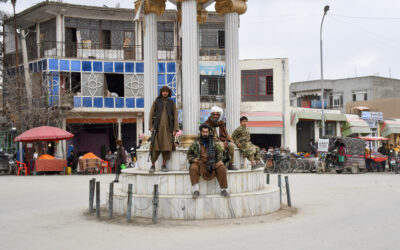
The Long Arm of China’s Security Services
SUBSCRIBER+ EXCLUSIVE REPORTING — When Chinese President Xi Jinping came to San Francisco last November to meet with President Joe Biden, Chinese pro-democracy activists in […] More
OPINION — We asked our students and colleagues a few questions recently. While sitting at home on your couch, did you see satellite images of Russian forces massing on the Ukrainian border in February 2022? Or the infamous tank convoys in March? Were you one of the 126 million Facebook users reached by the 2016 Russian influence campaign? Was your company or sector a victim of Chinese technology transfer because of lackluster cybersecurity or personnel practices?
The secret world of intelligence has never been more public. Foreign spies target American citizens and companies, not just our government agencies or military. The demand on the U.S. Intelligence Community (IC) to collect, analyze, and produce relevant intelligence has, accordingly, never been greater.
In government, the IC now supports consumers at the Departments of Treasury and Commerce, the U.S. Agency for International Development, various climate policy offices, state election security boards, local law enforcement agencies, private sector technology and cyber firms, and many more. This diversity of demand must be met by a corresponding elevation of intelligence education to empower future consumers.
Intelligence has a place in curricula as a functional tool for those pursuing careers in policy, government, business, law, and the military. Intelligence is no longer the sole purview of the President’s Daily Brief: more than ever, it is about open source and navigational instruments for an information world.
From data analysis to geopolitical risk management and from cybersecurity to social media impact, the tools of an intelligence education are those of successful twenty-first century careers. Structured Analytic Techniques, employed rigorously by IC analysts, offer tested, systematic problem-solving approaches. Surveying intelligence collection methods provides insight and appreciation for the trustworthiness of information sources. Brevity and clarity of communication—both in written assessments and oral briefings—are prized skills for budding analysts in any field. These tools provide frameworks and skillsets for individuals to make sense of the world as they move throughout careers in public service, the private sector, and non-governmental organizations.
Intelligence education empowers critical thinking to serve students throughout all career phases—particularly important for job-hopping and career-swapping millennials and Gen Z. Combatting misinformation and disinformation in an open democratic society requires supporting critical thinking at every juncture. Taking the most basic intelligence course is a transferable value-add for students seeking to maximize their potential. This provides a decision-making advantage for the student not just during their education but for the rest of their public and private lives.
So too, does it provide a value-add to policy outcomes. When incoming officials, staff, or appointees learn basics on the job, they operate within a reactionary, learning phase rather than proactive, informed engagement. This ultimately decreases the efficacy of timely decision-making. Intelligence coursework before entering government strengthens professional capacity. For example, an aspiring trade negotiator who was never exposed to basic intelligence functions may not be familiar with the types of intelligence support available to them. They might not know where to go or who to ask, understand how analysts reached their judgments, or how to make sense of it all in context. This is not an uncommon dynamic that suggests active consumer education and training can get ahead of the process versus reactionary, on the job learning.
Are you staying up to date on global events that are impacting US national security? Get your 10-minute daily brief with Suzanne Kelly and Brad Christian by signing up for The Cipher Brief’s Open Source Report Daily Newsletter or by listening to The Cipher Brief’s Open Source Report Podcast wherever you listen to podcasts.
Policy schools exist to provide students insight, education, and training of core competencies with tools for success in careers of public service. In the decade after 9/11, the number of intelligence-centric courses offered at American universities nearly tripled from 300 to over 840 in response to the dominance of military and terrorism concerns.
Today, it is not uncommon for a liberal arts college to offer an introductory survey course on intelligence. Many graduate programs training aspiring national officials, including degrees in public policy, administration, and international affairs, have some coursework grappling with intelligence as a functional instrument supporting policy education. Yet for today’s information dominant security environment, not enough institutions expose students to robust intelligence education.
Essential for any serious program are courses that provide an early grounding in methods of analysis, or “thinking about thinking.” Most courses typically skim three overlapping areas: organization and process, policy, and history. While all three are useful components, courses that prioritize student use of analytic techniques upskill enrollees and supports foundational intelligence education. These courses can be successfully crafted at the unclassified level with historical case studies using declassified reporting or by developing contemporary case studies akin to challenges seen by public or private sector leaders. The most impactful courses would incorporate methods for analyzing data from disparate sources and writing succinct, analytic products for varied audiences. Case studies could recreate the information environment using declassified documents from before 9/11 or the Cuban Missile Crisis and task students with developing analytic assessments using modern techniques.
We could imagine another contemporary case study with students dissecting the strategic information campaign levied by the United States ahead of Russia’s invasion of Ukraine.
The Biden Administration, in coordination with NATO Allies, spent months rapidly declassifying sensitive secrets and sharing them with Ukraine, allies, and the public. This provides a critical example of intelligence in policymaking. How did officials decide on this unusual, proactive information campaign? How did they protect sources and methods? Who were the targeted audiences and what were the goals? The American efforts are often credited today as one of the reasons the West was so prepared and unified in response to Russia’s invasion.
A key figure supporting the decision-making process was the Director of the Central Intelligence Agency, William Burns. By some accounts, this was masterclass in the modern use of intelligence to illuminate policy choices and shape international relations. His background? A career diplomat, the consummate consumer, with a deep understanding of intelligence learned through experience. Being an informed consumer equates to improved policy outcomes. It also means the ability to use the tools of intelligence, history, diplomacy, analysis, and strategic communication. The hard question we must ask ourselves as educators and policy professionals: how can we best equip tomorrow’s consumers by improving intelligence education today?
Read more expert-driven national security insights, perspective and analysis in The Cipher Brief
Related Articles

SUBSCRIBER+ EXCLUSIVE REPORTING — When Chinese President Xi Jinping came to San Francisco last November to meet with President Joe Biden, Chinese pro-democracy activists in […] More

SUBSCRIBER+EXCLUSIVE EXPERT PERSPECTIVE — More than two years after its withdrawal from Afghanistan, the U.S. still does not have a clear way forward in the […] More

SUBSCRIBER+ EXCLUSIVE REPORTING — Ukrainians greeted Saturday’s long-awaited House passage of $60.8 billion in aid with justifiable jubilation. For months, their soldiers, civilians, and political […] More

SUBSCRIBER+ EXCLUSIVE REPORTING — A race for control of space is underway, and just as on earth, the U.S. and China are the top competitors. […] More

SUBSCRIBER+ EXCLUSIVE REPORTING — For nearly a week, the Middle East and much of the world were on a knife’s edge, waiting for a promised […] More

BOTTOM LINE UP FRONT – Less than one week after Iran’s attack against Israel, Israel struck Iran early on Friday, hitting a military air base […] More
Search